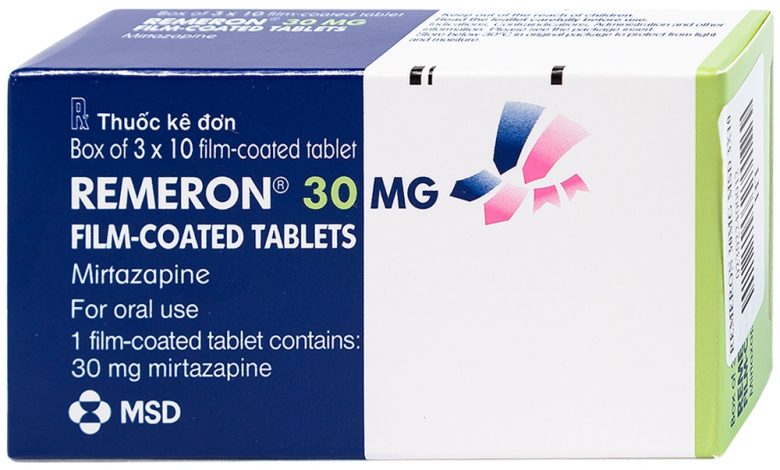Mirtazapine (Remeron): Uses, Benefits Dosage, Side Effects, Reviews

What Is Mirtazapine (Remeron) And What Does It Treat?
Mirtazapine (Remeron) is an antidepressant medication used alone or with other medication for the treatment of major depressive disorder (MDD). Mirtazapine has a dual mode of action. It is a noradrenergic and specific serotonergic antidepressant (NaSSA) that acts by antagonizing the adrenergic alpha2-autoreceptors and alpha2-heteroreceptors as well as by blocking 5-HT2 and 5-HT3 receptors.
What Is The Most Important Information I Should Know About Mirtazapine (Remeron)?
Do not stop taking Mirtazapine (Remeron), even when you feel better. With input from you, your health care provider will assess how long you will need to take the medicine.
Missing doses of Mirtazapine (Remeron) may increase your risk for relapse in your symptoms.
Stopping Mirtazapine (Remeron) abruptly may result in one or more of the following withdrawal symptoms: irritability, nausea, dizziness, vomiting, nightmares, headache, and/or paresthesias (prickling, tingling sensation on the skin).
Depression is also a part of bipolar illness. People with bipolar disorder who take antidepressants may be at risk for “switching” from depression into mania. Symptoms of mania include “high” or irritable mood, very high self-esteem, decreased need for sleep, pressure to keep talking, racing thoughts, being easily distracted, frequently involved in activities with a large risk for bad consequences (for example, excessive buying sprees).
Medical attention should be sought if serotonin syndrome is suspected. Please refer to serious side effects for signs/symptoms.
What Should I Discuss With My Health Care Provider Before Taking Mirtazapine (Remeron)?
• Symptoms of your condition that bother you the most
• If you have thoughts of suicide or harming yourself
• Medications you have taken in the past for your condition, whether they were effective or caused any adverse effects
• If you experience side effects from your medications, discuss them with your provider. Some side effects may pass with time, but others may require changes in the medication
• Any other psychiatric or medical problems you have, including a history of bipolar disorder
• All other medications you are currently taking (including over the counter products, herbal and nutritional supplements) and any medication allergies you have
• Other non-medication treatments you are receiving, such as talk therapy or substance abuse treatment. Your provider can explain how these different treatments work with the medication
• If you are pregnant, plan to become pregnant, or are breastfeeding
• If you drink alcohol or use drugs
How Should I Take Mirtazapine (Remeron)?
Mirtazapine (Remeron) is usually taken one time per day at bedtime with or without food.
Typically, patients begin at a low dose of medicine and the dose is increased slowly over several weeks.
The dose usually ranges from 15 mg to 45 mg. Only your health care provider can determine the correct dose for you.
Mirtazapine (Remeron) orally disintegrating tablets will dissolve in your mouth within seconds and can be swallowed with or without liquid.
Mirtazapine (Remeron) orally disintegrating tablets must remain in their original packaging. Open the package with clean dry hands before each dose. Do not try to put tablets in a pillbox if you take the orally disintegrating tablets.
Consider using a calendar, pillbox, alarm clock, or cell phone alert to help you remember to take your medication. You may also ask a family member or friend to remind you or check in with you to be sure you are taking your medication.
What Happens If I Miss A Dose Of Mirtazapine (Remeron)?
If you miss a dose of Mirtazapine (Remeron), take it as soon as you remember, unless it is closer to the time of your next dose. Discuss this with your health care provider. Do not double your next dose or take more than what is prescribed.
What Should I Avoid While Taking Mirtazapine (Remeron)?
Avoid drinking alcohol or using illegal drugs while you are taking antidepressant medications. They may decrease the benefits (e.g., worsen your condition) and increase adverse effects (e.g., sedation) of the medication.
What Happens If I Overdose With Mirtazapine (Remeron)?
If an overdose occurs, call your doctor or 911. You may need urgent medical care. You may also contact the poison control center at 1-800-222-1222. A specific treatment to reverse the effects of Mirtazapine (Remeron) does not exist.
How Long Does It Take For Mirtazapine (Remeron) To Work?
Sleep, energy, or appetite may show some improvement within the first 1-2 weeks. Improvement in these physical symptoms can be an important early signal that the medication is working. Depressed mood and lack of interest in activities may need up to 6-8 weeks to fully improve.
Can a pregnant woman take Mirtazapine (Remeron)?
If you are planning on becoming pregnant, notify your health care provider to best manage your medications. People living with MDD who wish to become pregnant face important decisions. Untreated MDD has risks to the fetus, as well as the mother. It is important to discuss the risks and benefits of treatment with your doctor and caregivers.
Can a breastfeeding woman take Mirtazapine (Remeron)?
Caution is advised with breastfeeding since Mirtazapine (Remeron) does pass into breast milk.
What Are The Possible Side Effects Of Mirtazapine (Remeron)?
Common side effects
• Sedation
• Increased appetite
• Weight gain
• Feeling dizzy
• Increased cholesterol/triglyceride levels
Rare/serious side effects
Angle-closure glaucoma (symptoms of angle-closure glaucoma may include eye pain, changes in vision, swelling, or redness in or around the eye)
Agranulocytosis (low white blood cell count) can increase the risk of infection. If you develop symptoms of infection, such as fever, chills, sore throat, swelling of the lining of the mouth, or other possible signs of infection, contact your prescriber.
Serotonin syndrome (symptoms may include shivering, diarrhea, confusion, severe muscle tightness, fever, seizures, and death), seizures.
Are There Any Risks For Taking Mirtazapine (Remeron) For Long Periods Of Time?
To date, there are no known problems associated with the long-term use of Mirtazapine (Remeron). It is a safe and effective medication when used as directed.
What Other Medications May Interact With Mirtazapine (Remeron)?
Mirtazapine (Remeron) should not be taken with or within 2 weeks of taking monoamine oxidase inhibitors (MAOIs). These include phenelzine (Nardil®), tranylcypromine (Parnate®), isocarboxazid (Marplan®), rasagiline (Azilect®), and selegiline (Emsam®).
Although rare, there is an increased risk of serotonin syndrome when Mirtazapine (Remeron) is used with other medications that increase serotonin, such as other antidepressants, migraine medications called “triptans” (e.g., Imitrex®), some pain medications (e.g., tramadol (Ultram®), and the antibiotic linezolid (Zyvox®).





